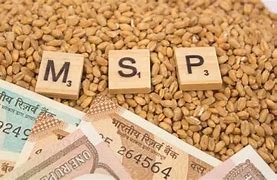Context:
The Cabinet Committee on Economic Affairs (CCEA) recently approved an increase in the Minimum Support Prices (MSP) for all mandated Rabi crops for the Marketing Season 2025-26.
More on the News
- This move aims to provide farmers with remunerative prices, ensuring their financial stability and encouraging crop diversification.
- The government has significantly raised the MSP for several key Rabi crops, with the highest increment for Rapeseed & Mustard at ₹300 per quintal and Lentil (Masur) at ₹275 per quintal.
- The increase in MSP is in line with the Union Budget 2018-19 announcement of fixing the MSP at a level of at least 1.5 times of the All-India weighted average Cost of Production.
Revision in MSP for Rabi crops
- Wheat: The MSP for Wheat has been increased to ₹2425 per quintal, a ₹150 rise from the previous season. This ensures a 105% margin over the cost of production.
- Barley: With an increment to ₹1980 per quintal, the MSP for Barley reflects a significant increase of ₹130, offering a 60% margin over cost to farmers.
- Gram: The MSP for Gram has now reached ₹5650 per quintal, marking a ₹210 increase, thereby providing farmers with a 60% profit margin.
- Lentil (Masur): The new MSP of ₹6700 per quintal for Lentil (Masur) shows a substantial ₹275 increase, offering an 89% margin over the production cost.
- Rapeseed & Mustard: The MSP for Rapeseed & Mustard has been set at ₹5950 per quintal, showcasing a generous increase of ₹300 and ensuring a 98% margin for farmers.
- Safflower: Finally, the MSP for Safflower has increased to ₹5940 per quintal, with a ₹140 rise, ensuring a 50% margin over production costs.

 Minimum Support Price (MSP)
Minimum Support Price (MSP)
- The MSP is a form of market intervention by the Government to insure agricultural producers against any sharp fall in farm prices.
- MSPs are announced by the Cabinet Committee on Economic Affairs (CCEA) at the beginning of the sowing season for certain crops (currently 23) based on the recommendations of the Commission for Agricultural Costs and Prices (CACP).
- The major objectives are to support the farmers from distress sales and to procure food grains for public distribution.
In formulating the recommendations for minimum support prices, the CACP takes into account various factors such as –
- cost of production (A2+FL method),
- demand and supply conditions,
- inter-crop price parity,
- effect on the general price level,
- domestic and international prices, etc.
Currently, the government announces minimum support prices (MSPs) for 22 Mandated Crops and FRP (fair and remunerative price) for sugarcane.
- In addition, the MSPs of toria and de-husked coconut are fixed based on the MSPs of rapeseed/mustard and copra, respectively.

The list of crops is as follows –
- Cereals (7) – paddy, wheat, maize, jowar (sorghum), bajra (pearl millet), barley and ragi
- Oilseeds (7) – groundnut, rapeseed-mustard (+ toria), soybean, sesamum, sunflower, safflower, nigerseed
- Pulses (5) – gram, tur, moong, urad, Masur (lentil)
- Commercial crops (4) – copra, sugarcane, cotton and raw jute.
Out of these crops, 14 are in the Kharif season and 6 are of the Rabi season.
- Kharif Crops (14) – paddy, jowar, bajra, maize, ragi, tur, moong, urad, groundnut, soyabean, sesamum, sunflower, nigerseed, cotton.
- Rabi Crops (6) – wheat, barley, gram, masur, rapeseed-mustard (+ toria), safflower.
- Other Crops (3) – Sugarcane, Raw Jute, Copra (+ de-husked coconut)
About Commission for Agricultural Costs & Prices (CACP)
- CACP is an attached office of the Ministry of Agriculture and Farmers Welfare, Government of India.
- It came into existence in January 1965 as the Agricultural Prices Commission. It was later renamed as CACP in 1985.
- Currently, the Commission comprises a Chairman, a Member Secretary, one Member (Official) and two Members (Non-Official).
- The non-official members are representatives of the farming community and usually have an active association with the farming community.

